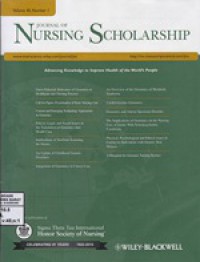
Jurnal
The Meaning of Evidence-Based Management to Brazilian Senior Nurse Leaders
Purpose: The study objective was to understand the meaning of evidencebased management for senior nurse leaders in accredited, public hospitals in the State of Sao Paulo, Brazil. Design and Method: A phenomenological approach was used to analyze interviews conducted with 10 senior nurse leaders between August 2011 and March 2012. The analytic method was developed by the Brazilian phenomenologist, Martins. Findings: Senior nurse leaders described how they critically appraise many sources of evidence when making managerial decisions. They emphasized the importance of working with their teams to locally adapt and evaluate best evidence associated with managerial decision making and organizational innovations. Their statements also demonstrated how they use evidence-based management to support the adoption of evidence-based practices. They did not, however, provide specific strategies for seeking out and obtaining evidence. Notable challenges were traditional cultures and rigid bureaucracies, while major facilitators included accreditation, teamwork, and shared decision making. Conclusions: Evidence-based management necessitates a continuous process of locating, implementing, and evaluating evidence. In this study leaders provided multiple, concrete examples of all these processes except seeking out and locating evidence. They also gave examples of other leadership skills associated with successful adoption of evidence-based practice and management, particularly interdisciplinary teamwork and shared decision making. Clinical Relevance: This study demonstrates senior nurse leaders’ awareness and utilization of evidence-based management. The study also suggests what aspects of evidence-based management need further development, such as more active identification of potential, new organizational innovations.
Availability
No copy data
Detail Information
- Series Title
-
Journal of Nursing Scholarship, Volume 45, Number 3 2013
- Call Number
-
(05) 610.5 WIL j
- Publisher
- Malden : Wiley-Blackwell., 2013
- Collation
-
Hlm. 265-272
- Language
-
English
- ISBN/ISSN
-
1527-6546
- Classification
-
(05) 610.5 WIL j
- Content Type
-
-
- Media Type
-
-
- Carrier Type
-
-
- Edition
-
Volume 45, Number 3
- Subject(s)
- Specific Detail Info
-
-
- Statement of Responsibility
-
-
Other version/related
No other version available
File Attachment
Comments
You must be logged in to post a comment
 Computer Science, Information & General Works
Computer Science, Information & General Works  Philosophy & Psychology
Philosophy & Psychology  Religion
Religion  Social Sciences
Social Sciences  Language
Language  Pure Science
Pure Science  Applied Sciences
Applied Sciences  Art & Recreation
Art & Recreation  Literature
Literature  History & Geography
History & Geography